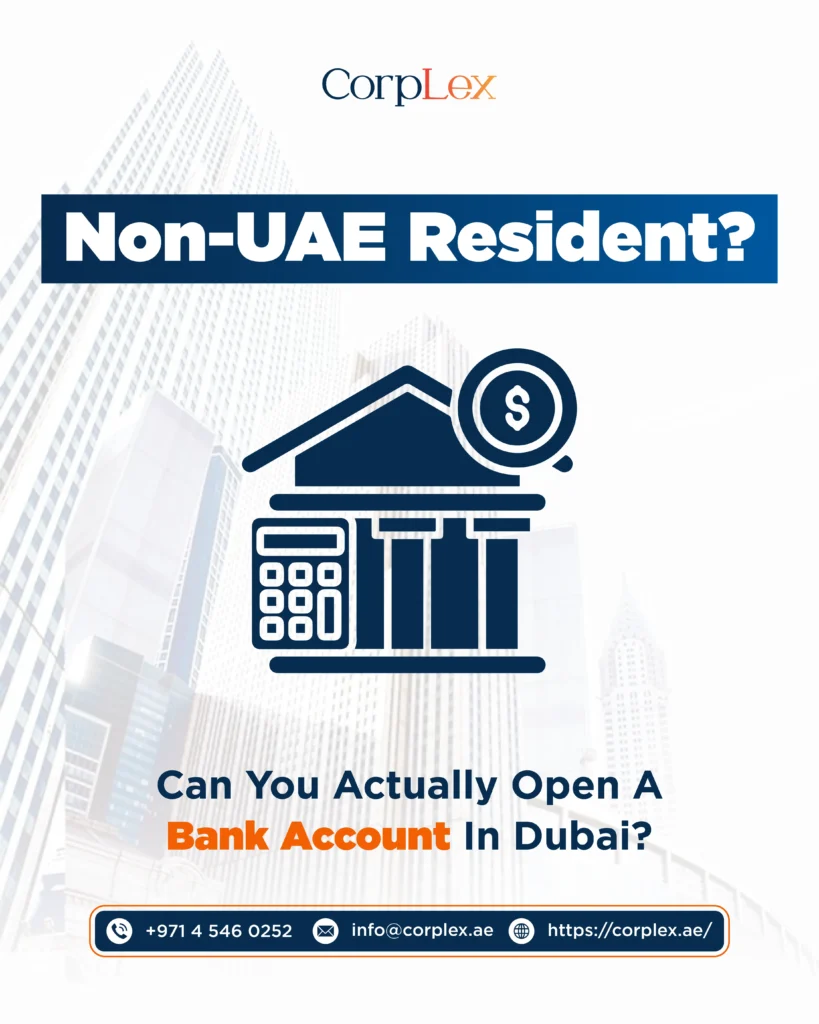The expeditiously flourishing status of Dubai’s financial realm has elevated the repute of banking operations, exceeding local expectations and leveling up to global standards. Majoring in providing safe and innovative banking solutions, and prioritizing customers’ focused approaches; High ranking and reputable banks in the UAE have successfully raised the bar when it comes to financial operations. With evolving regulations, banks continue to attract both local and international clients who want to open a bank account in Dubai for non-residents.
Explore your UAE banking options and open the right account with our expert support.
Non-Resident Bank Account Opening in Dubai

- Is it possible for non-residents to open bank accounts in Dubai?
- Yes, Opening a bank account in Dubai for non-residents is possible as the latter has become an international financial arena, however, there are specific requirements and restrictions for the process, in which shall be prevailed in “Documents Required to Open a Non-Resident Bank Account” section.
What differentiates personal from corporate bank accounts?
Personal bank accounts: While personal accounts are typically adjusted for individual use, such as savings, credit cards, personal loans, and mortgages.
Corporate bank accounts: Corporate bank accounts are required for corporations. These business accounts offer higher transaction limits, recordkeeping, business loans, and advanced levels of secured payments, all of which operate within the frame of regulatory compliance.
Onshore V.S Offshore Options:
Onshore bank account :When an individual or an entity opens a bank account in their place of residence, they are granted the benefit of numerous services, both in the physical and digital aspects, and offered higher payment flexibility and safety options. Such an account is entitled an onshore bank account, and it can be current, savings, salary, or corporate bank account.
Offshore bank account : An offshore bank account is specifically designed for the needs of foreigners or entities that do not reside in the country of bank’s location, this type of account tends to target foreign investments and offer a wider scope of financial services, such as secured financial transactions, assets holding, and engaging in international banking with lower fees known as tax benefits. These accounts can only be savings accounts, accepting multiple currencies, and in some cases, international financing services.
Thus, if an international investor wishes to open a bank account, whether personal or corporate, the better choice would be to open an offshore bank account as a non-resident. The opposite is true for local investors and individuals.
If you’re planning to operate a business in the UAE, check out our step-by-step guide to open a corporate bank account in Dubai for your company.
Types of Bank Accounts in Dubai for Non-Residents
Personal Savings Account:
This option allows foreigners outside the country of the bank’s location, to open a bank account for personal use. This account differs from the current-daily use account, as a debit card is given but no checkbook can be handed in. However, this bank account offers a great deal of secured online financial transactions, ensuring various currency availability, and access to global financial tools.
Offshore Corporate Accounts:
This account is the key tool used to manage companies operating within cross-boarders financially, as it assists international corporations to benefit from tax advantages, discretion, secured access to international markets, using multiple currencies, and the implementation of various business operations miles apart, as the company opens a corporate bank account which is situated outside the place of incorporation.
Investment or Wealth Management Accounts:
This is a specialized banking service tailored for individuals or entities aiming to grow and protect wealth internationally, this account targets high-net-worth individuals seeking protection and making international investments, where the minimum deposit starts from one hundred thousand Dirhams.
Documents Required to Open a Non-Resident Bank Account in Dubai
To be able to open a bank account as a non-resident in UAE, the following documents are to be prepared:
In case of an individual:
- Proof of nationality: A scanned coloured copy of the passport, in addition to the UAE’s entry permit.
- Recent utility bill (of the past two months)
- An original copy of the individual’s current bank reference letter -usually the bank in the applier’s home country-.
- An updated CV.
- Last six months bank statement.
P.S: Some banks require additional documents in cases of high-risk client suspicion, such as SOF and SOW (Source of funds and source of wealth), in addition to deposit requirement for opening the bank account.
In case of an entity/corporation:
- Certificate of incorporation
- Memorandum of Association (MOA) or AOA
- Shareholder and UBO’s (ultimate beneficial owner) passports plus bank’s signatory CV
- Proof of home country’s address (utility bills)
- Business plan or company portfolio
- Six months bank statement
Opening a non-resident bank account in Dubai requires strict compliance with AML regulations. Learn more in our detailed AML compliance guide.
Step-by Step Process to Open a Non-Resident Bank Account in Dubai:
Open a non-resident bank account in these following steps:
- Obtain initial approval for bank account opening, banks will require your verification documents such as the passport and CV, then proceed to run AML compliance checks, and filling in KYC (know your customer) forms, they will either proceed or refuse.
- Visit a UAE bank branch in person.
- Prepare the required documents, such as proof of residence (utility bill of last two months), and source of income.
- Banks require a deposit amount that needs to be added monthly.
- Receive the non-resident bank account’s debit card.
Best Banks in Dubai for Non-Resident Accounts Emirates NBD (National Bank of Dubai): it is the leading bank in UAE, offering secured savings accounts for non-residents with online banking services.
- Mashreq Bank: this bank provides digital banking services and investment-friendly accounts.
- HSBC UAE: global money accounts, suitable for high-net worth clients.
- RAKBANK: assists with international and offshore banking.
These banks are suitable for individuals seeking easy international transactions.
Challenges and Considerations
Due to the increased rate of tax invaders, strategically organized crime, and money launderers, the use of banking services within a foreign jurisdiction is considered a risky banking operation, and banks are shielding themselves through complicating the process.
- Opening a bank account for non-residents takes from fifteen days up to three months to be opened, which is a relatively long period of time.
- Banks go through a thorough process of getting to know the client and verifying his identity before allowing him to be an overseas customer, thus they perform stricter AML compliance checks.
- Non-resident bank account opening in UAE require a high minimum balance condition, where the range starts from twenty-five thousand Dirhams reaching up to one hundred thousand Dirhams.
- Compared to residents’ accounts privileges, non-residents have restricted services as they are only entitled to a debit card issuance -but not a check book-, and low acceptance rate, banks are extremely precautious when it comes to offshore accounts, equipped with enhanced due diligence procedures. Also, non-residents are faced with higher service charges and penalties in case minimum balance requirements aren’t met.
Tips To Improve Approval Rates:
To have a better chance at opening a non-resident bank account, you should:
- Prevail strong financial background, high-net individuals have a greater chance of being accepted and admitted than others, thus make sure the bank statement displays a strong financial status.
- If you’re a corporation, one should make sure the activity performed is a low-risk business.
- Work with banking professionals such as CSPs or bank employees.
- Be transparent and straightforward when it comes to the source of funds.
Final Thoughts
Is Opening a Non-Resident Bank Account Worth It?
To sum up, an offshore bank account is a financial account that individuals often resort to for performing global transactions, while benefiting from assets protection and privacy, lower tax rates, diversified currency exposure, and access to international financial markets and tools. Thus, if you have an operating business running in a different country, or you are thinking of becoming a foreign investor, this might be the best choice for you. Nevertheless, one should be aware of the long process awaiting him, the non-ending document requirements, along with the uncertainty of approval.
- Review the following table for more clarity on the next steps to consider:
| When it’s best to go offshore: Non-Resident Bank Account Opening | When it’s best to wait for Residency Issuance |
| A need for a UAE bank account because you have real estate investments or other assets in the UAE. | You are setting up a business with a UAE trade license, whether it’s a mainland or a freezone entity. |
| You live abroad and have no plans of residing in UAE | You plan to reside or work in the UAE |
| You have sufficient capital allowing the opening and maintaining of an offshore bank account balance | You don’t wish to tie up to a large capital, residents’ bank accounts tend to be more flexible regarding the minimum balance requirement. |
| You value confidentiality and flexibility | You want to escape the excessive documentation requirement phase |
Contact us today for a consultation and take the first step toward securing your bank account in Dubai for non-residents with confidence.
FAQs
-
Will the funds be frozen if the non-resident hasn’t visited for a while?
Some banks require account activity; banks may either freeze or incur extra fees on dormant accounts that go through over twelve months of inactivity.
-
What happens if the non-resident got his UAE residency?
Some banks might allow the conversion or upgrading of the bank account without closing it. While other banks may require a reapplication under new KYC forms and regulations.
-
What if the minimum balance isn’t maintained?
Banks often enforce a monthly penalty for such incurring. The account could also be closed after warning.
-
Do the documents need to be renewed or updated?
Many banks require annual KYC forms revalidation as well as AML checks, if the documents are unattained, or subject to being expired, the account could be frozen.
-
Is it possible to apply for a credit card?
This is very unlikely to be approved, as most banks issue credit cards for UAE residents with proof of income or salary transfer.

